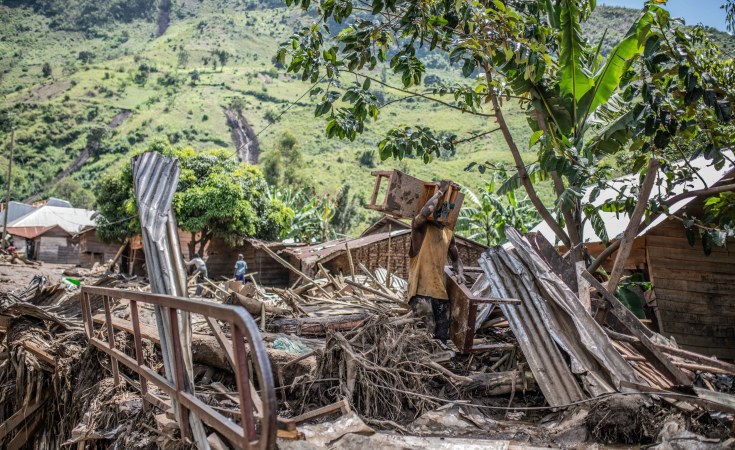Dakar, Senegal — Ulrich Crépin Namfeibona is head of the emergency team sent by Médecins Sans Frontières/Doctors Without Borders (MSF) to respond to devastating floods that hit the east of Democratic Republic of Congo on the night of 4 May, leaving 400 people dead. This is his first person account.
“On the morning of Friday 5 May, our emergency team was informed by authorities that, overnight, floods and landslides had hit Nyamukubi and Bushushu, two villages with a total of around 14,000 inhabitants, in Kalehe territory in South Kivu province, in the east of Democratic Republic of Congo (DRC). Following calls with community leaders and local health workers, we soon realised we were facing a major catastrophe.
We mobilised quickly to depart the next day. I travelled with one team by motorbike to Nyamukubi from Minova, where we are assisting displaced people fleeing conflict; the other team left by car towards Bushushu from MSF’s base in Bukavu, the provincial capital, carrying medicines and medical supplies for treating wounded people, as well as body bags.
It was shocking to arrive at the usually vibrant village, where we had often stopped off, to find it had nearly disappeared. More than half of the village had been washed away: the houses, the market, the fields, the cattle, the water system... All was rubble and destruction.
That Thursday, Nyamukubi had hosted the region’s weekly market day, which attracts visitors from as far away as Bukavu and Goma, so the area had around twice the usual population. The disaster caught everyone by surprise. After the first landslide, many people fled, but the river overflowed, leaving no way to escape, while the heavy rain continued.
Arriving at the health centre in Nyamukubi, it felt as if all the remaining villagers were there. The rooms were full of injured people – they were everywhere, on the beds, on the floors – and there were many relatives too. There was panic, people crying and shouting, and the local health staff seemed overwhelmed.
The first thing we did was to help manage the crowd and triage patients. We identified which patients were the most critical ones, who needed specialist care to survive, and which ones were moderately injured so could be treated on the spot. Two patients with head trauma injuries died shortly after our arrival.
Meanwhile, in Kalehe town, the second team had found a very similar situation, with dozens of wounded patients who had already been transferred from Bushushu village.
We had to think fast as we faced a major challenge: the main road crossing the disaster-hit area had been cut off by the landslide and water erosion and was now unusable. Thanks to the community, we identified the owner of a commercial boat who ran daily trips to Goma via Lake Kivu. We rented the boat then made some checks and adaptations, moving some seats to properly position the patients.

That same day we used the boat to transfer 16 seriously injured people from Nyamukubi to Kalehe. They had open and closed fractures, in the limbs, in the body, with polytraumas… As we only had enough fuel for a short trip, we took them first to the port of Kalehe, and then we made a series of journeys on a damaged unpaved road to take them to the town’s hospital, where they joined 59 other injured patients.
The following day, on 7 May, we transferred 28 of these patients to Bukavu provincial hospital on a four-hour boat journey. Among them there were several children and pregnant women. Everyone was accompanied by a relative.
Over the following days, we did further evacuations of seriously injured patients from the affected areas to Bukavu, in cooperation with health authorities and other organisations, now using more sophisticated boats. We transferred a total of 41 patients to the provincial hospital in Bukavu.
It was an extremely challenging operation, with difficult decisions to take, as not every relative could be taken on board. At some point I stopped asking patients about the whereabouts of their relatives; their answers often confirmed the loss of beloved ones.
Back in the flood-hit villages, some slightly wounded patients who were ready to be discharged remained at the health centres, which have become a refuge for displaced people. What can you do when you no longer have a home? Other people are sheltering in churches, schools and any administrative buildings that are still standing.
Today, people whose houses were not destroyed are hosting up to five families. Some villagers have moved up to the hill and set up makeshift shelters there, while many others have gone to nearby villages.
By 11 May, several NGOs and UN agencies had arrived in Kalehe town and were either providing aid or getting ready to do so. The most urgent humanitarian needs are shelter, drinking water, essential relief items, food, protection for the many children who have lost their parents, and psychosocial support to cope with this tragedy. We at MSF remain vigilant about the condition of the wounded people and other medical needs that could arise.
So far, more than 400 people have been confirmed dead, but local authorities estimate that several thousand are still missing, particularly in Nyamukubi. The hope of finding them alive has faded away and the search for the dead bodies, managed by the Congolese Red Cross and the local community, continues unabated, hampered by a lack of logistical means to deal with a catastrophe of this magnitude, which will long haunt the memories of the population.”


